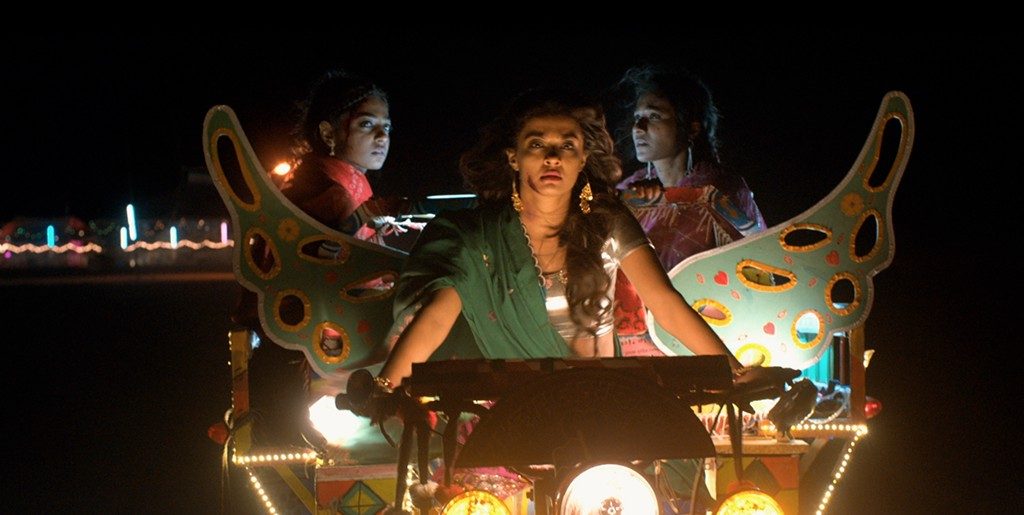Leena Yadav was born in Mhow, India. She began her career as an editor on commercials and an assistant director for television. She made her directorial debut with “Shabd,” followed by “Teen Patti” and “Parched.” (Press materials)
“Parched” will premiere at the 2015 Toronto International Film Festival on September 12.
W&H: Please give us your description of the film playing.
LY: “Parched” is the story of four spirited rural Indian women who dare to question and then break free from century-old traditions that have kept them locked in servitude.
W&H: What drew you to this story?
LY: In 2012, I was traveling through remote parts of Kutch, India, looking for stories. I met quite a few women with whom I struck a friendship. Some of them shared their life stories with me.
Once I returned to Mumbai, it struck me — the stories of these women were stories of every woman, everywhere. Cultures and circumstances may vary, but their struggles and inner lives are instantly recognizable across time and space. I knew then that these stories had to be shared, discussed and acknowledged by the world.
W&H: What was the biggest challenge in making the film?
LY: The biggest challenge we faced was to find financing for this film. Finding persons who believed that money was worth spending on a film that showed harsh realities, a film that did not boast any renowned stars, a film that has women as protagonists. It was no easy task.
Every step of the way was a challenge. The investments trickled in slowly from people who believed in the vision of this film. It was Aseem Bajaj, my husband and producer, who stood by the film like a rock and allowed me to make it without any compromises.
W&H: What do you want people to think about when they are leaving the theater?
LY: “Parched” touches a raw nerve, and it can ignite a dialogue that the world desperately needs to have. My dream is that when people come out of this film, they have a discussion. They may agree or disagree with the film — as long as people discuss the themes within the film, see the world through the prism of “Parched” for a while, that’s enough. It will make the blood, sweat and tears of the past three years worthwhile.
W&H: What advice do you have for other female directors?
LY: If you have a story to tell, go out there and tell it. Don’t do it as a female: Do it as an individual who has a unique way of seeing the world and addressing the story. If being a woman restricts your attempts or opportunities, don’t give up. There will always be a way.
W&H: What’s the biggest misconception about you and your work?
LY: My first two films were with big Bollywood stars, so I was always asked which star would I be working with next, instead of being asked what film I’m making next. I think I have broken that mold with “Parched.”
Also, I have always been asked how I feel as a woman director in certain situations. I don’t really know how to answer that question as I have not experienced those situations as a man. I can definitely answer any question as an individual. Men or women, we are storytellers and I know the journey is equally challenging for all of us.
W&H: How did you get your film funded? Share some insights into how you got the film made.
LY: The film was very difficult to get financed. Since my producer and I wanted to make the film without any compromises, we decided to look for private funding. The first person to support our vision was Indian actor Ajay Devgn, who gave us seed money and invaluable support to raise more funds. Then Gulab Singh Tanwar, an aviator by profession, came on board, supporting the vision of this film and helping us finish principal photography. Rohan Jagdale, a businessman, saw a rough trailer we put together after we finished the shoot. Thanks to him, we had post-production funds.
But faced with certain challenges, we had to take loans from various friends — we call them angels. We also took loans on interest in order to get the film to the finishing line. It has been a challenging journey, but also a very gratifying one for the support and love that has poured in for this film from various, and sometimes unexpected, quarters.
W&H: Name your favorite woman-directed film and why?
LY: One of my all-time favorite films is “Lost in Translation,” directed by Sofia Coppola. I have watched this film many times over the years and I always find new subtleties that have been captured in this complex relationship between two strangers in a strange land. The film is very telling of the times we live in. It is very real. I find it heartbreaking for so many reasons. And that ephemeral sense of pain is what draws me into the film each time.







